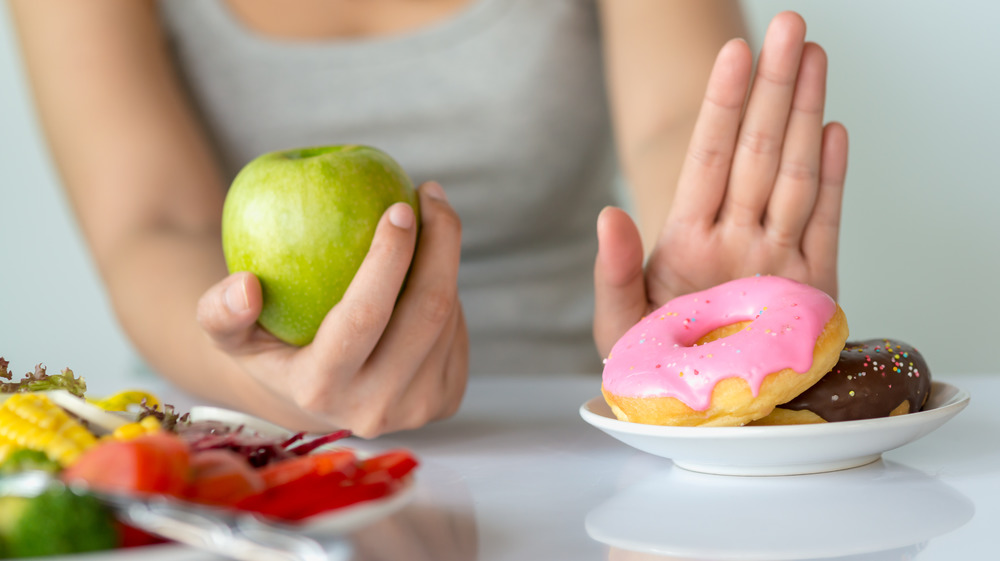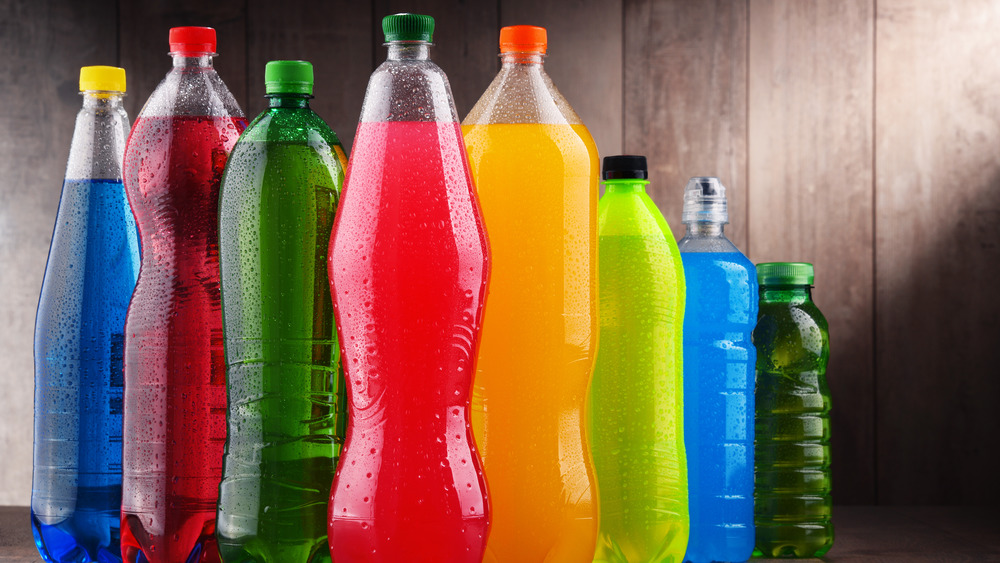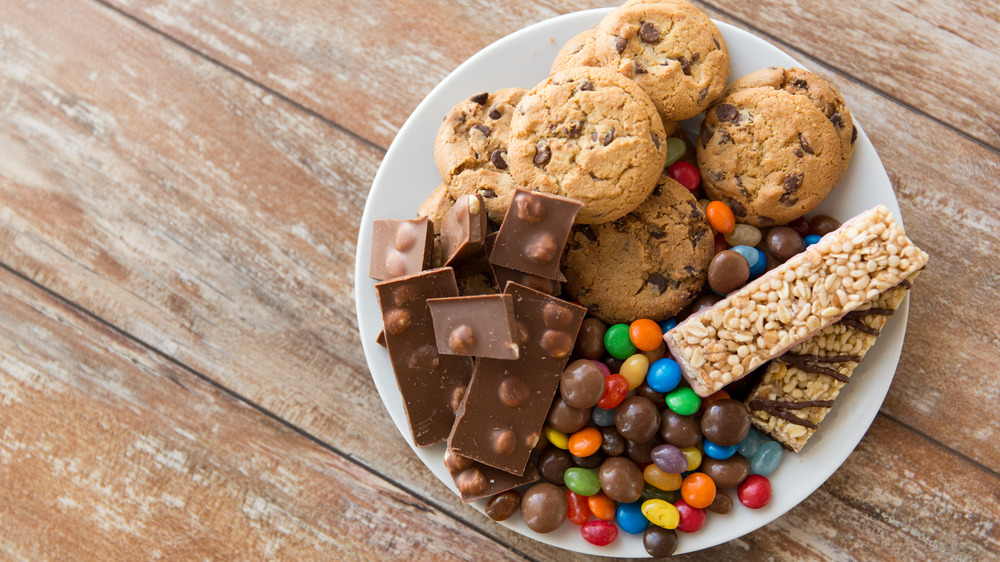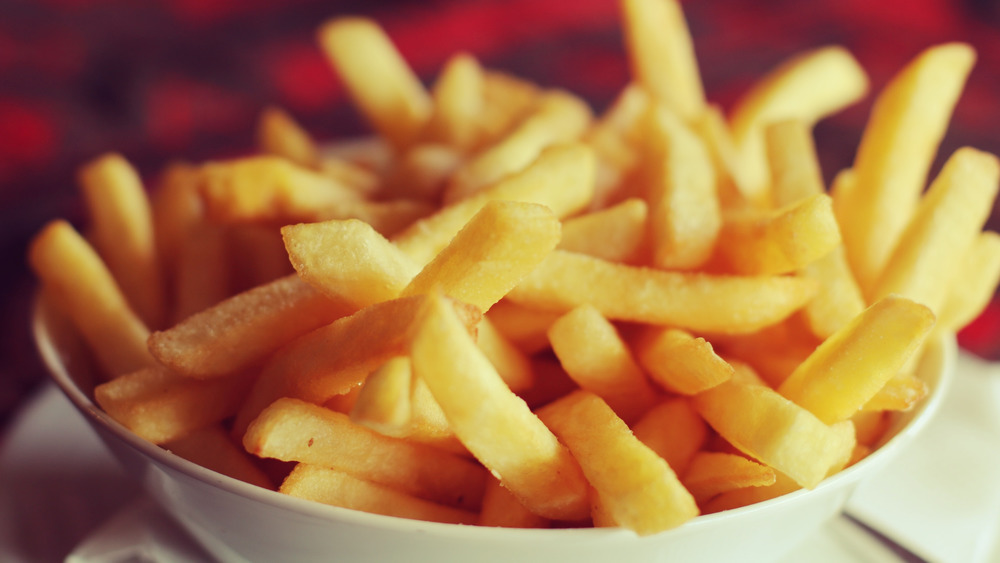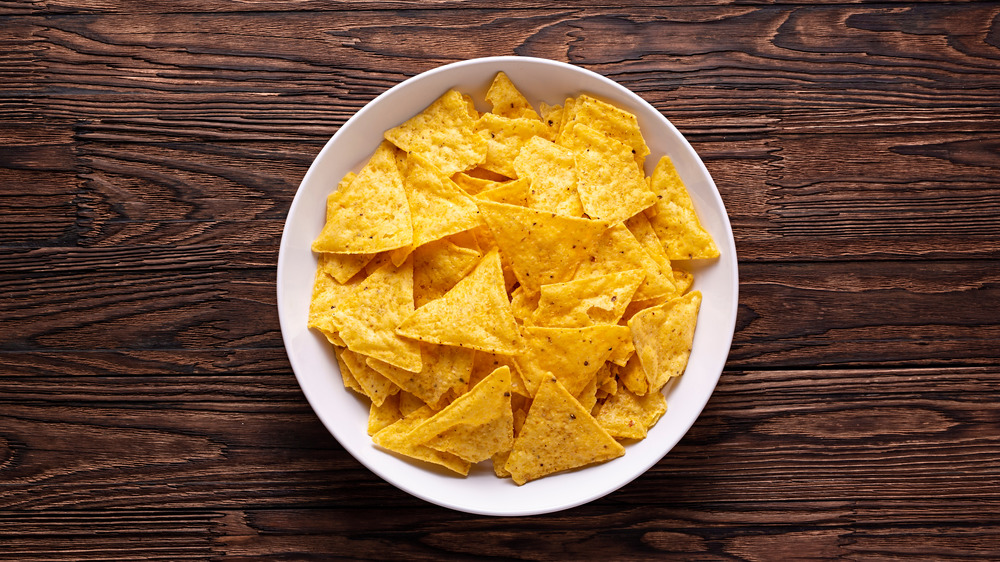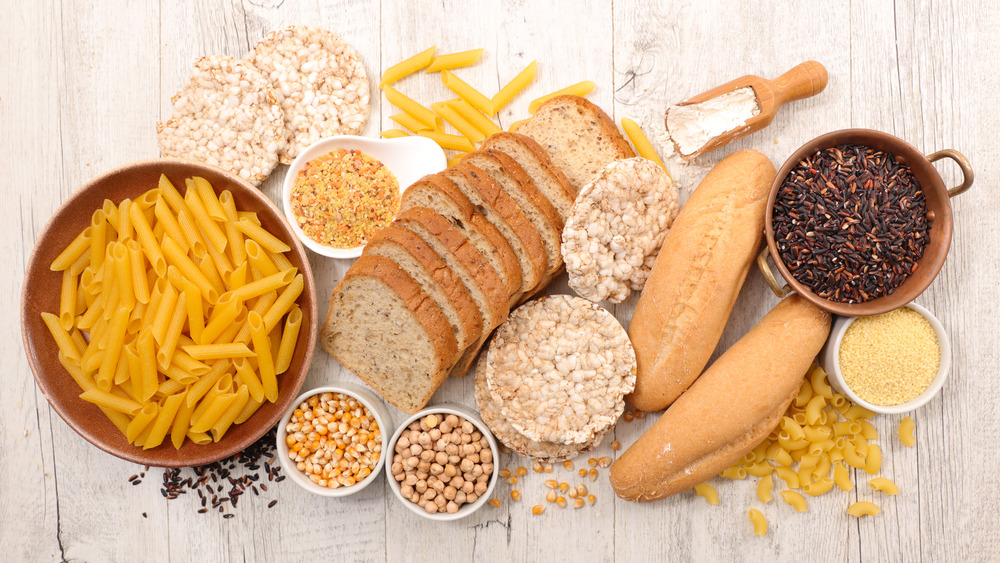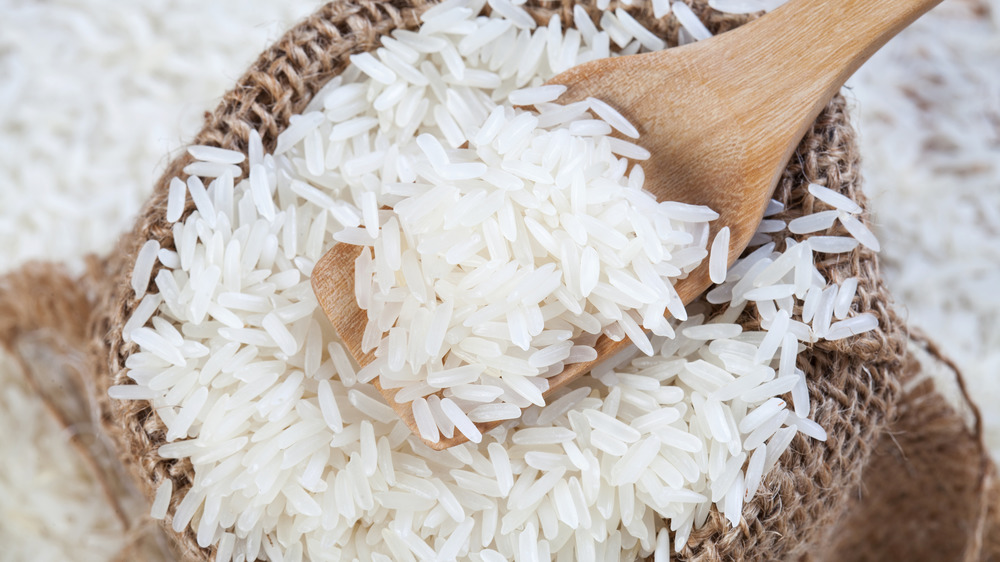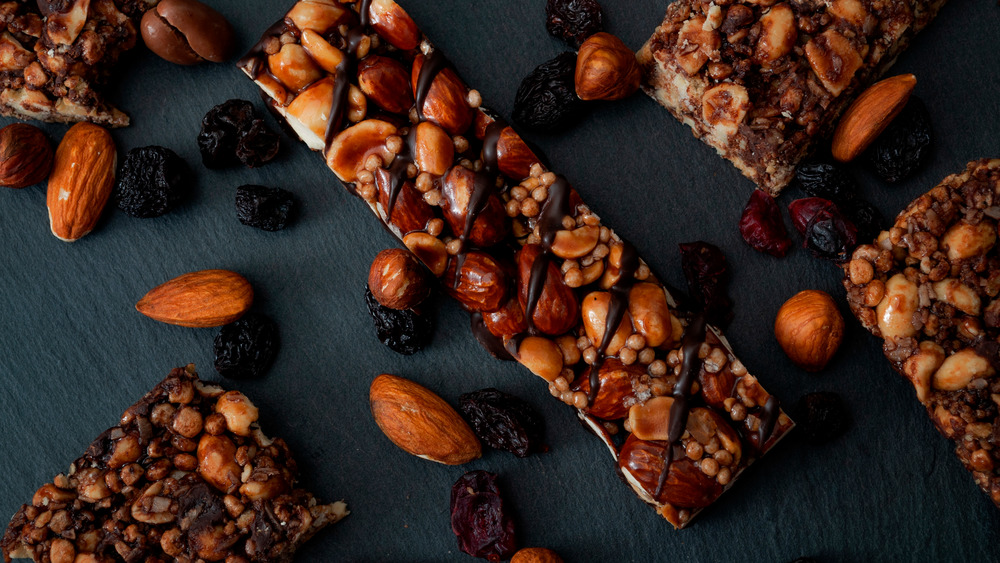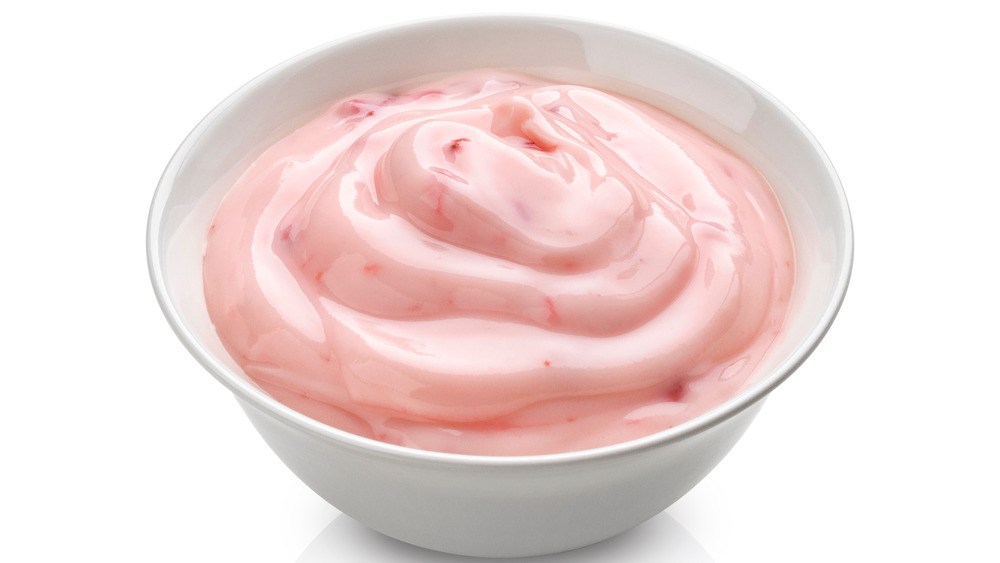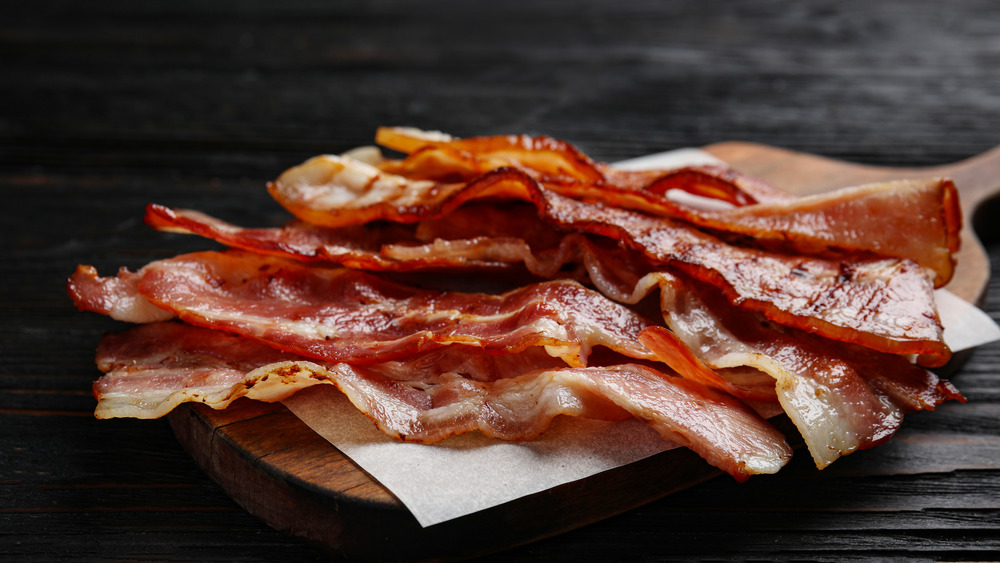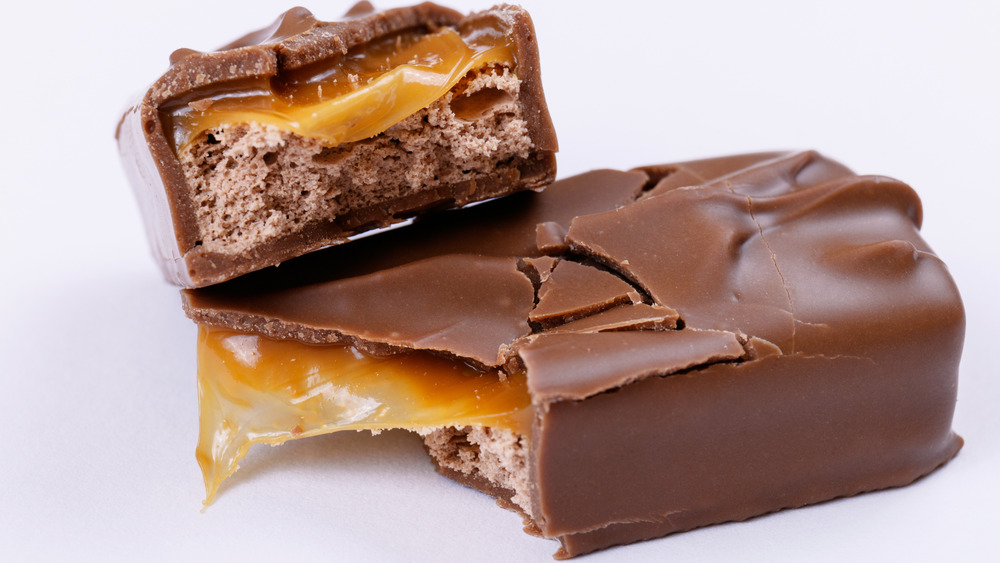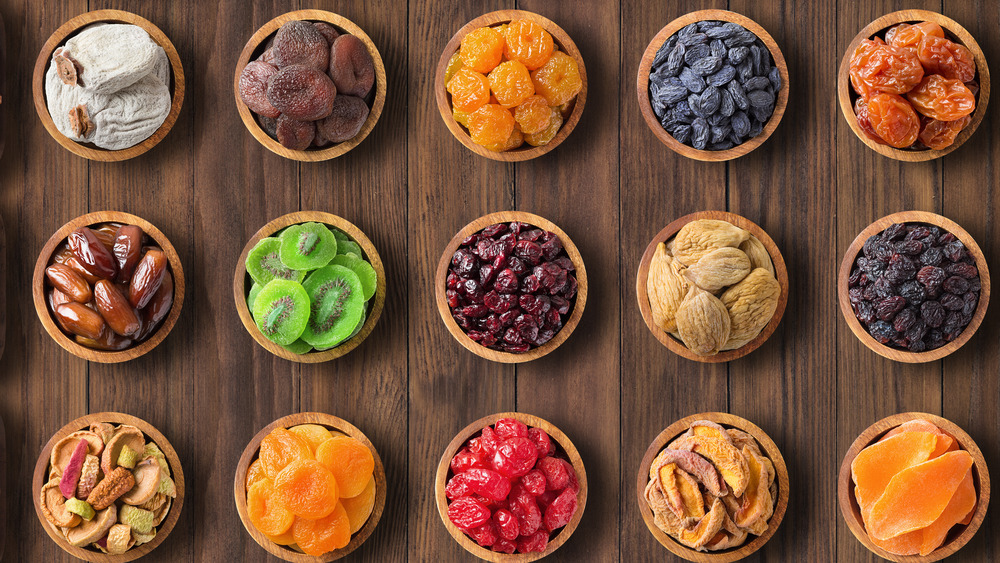Avoid These Foods If You're Trying To Lose Weight
Losing weight and keeping weight off can be difficult. According to the Cleveland Clinic, up to 62 percent of Americans are considered "overweight" or "obese," and this number is growing. When you try to lose weight, it may feel as if your body tries to fight back. You might be able to lose weight at first without much effort but over time, weight loss slows down or stops altogether.
As part of a meta-analysis reported in the New England Journal of Medicine, researchers tracked over 120,000 men and women from three different studies. Every four years, they evaluated the participants' lifestyles and weight. What they found was that the average adult was gaining 3.35 pounds over each four-year period, adding up to nearly 17 pounds after 20 years. When researchers looked more closely, they found that a handful of foods are specifically linked to weight gain. Indeed, the foods you eat can raise — or lower — your weight. Keep reading to learn about the foods to avoid if you are trying to lose weight.
Stay away from the sugary and diet drinks
If you are trying to lose weight, it is important to think about what is in your glass as well as what you have put on your plate. The right beverage can keep weight loss in check, curb appetite, and cut calorie intakes. A 2015 research article published in Health Affairs found greater weight gain in children and adolescents who consumed sugar-sweetened drinks compared to those who do not consume these beverages.
Diet soda can also sabotage weight loss and lead to weight gain. While most varieties of diet soda have zero or few calories, they contain no sufficient nutrition. A study in Appetite also suggested that diet soda can alter pleasure sensors in the brain leading to increased appetite, a desire for high calorie-foods and sugary snack choices, and a decreased satisfaction with sugar and sweet foods.
Your best bet for replacing sweetened beverages and diet soda is water. You can save hundreds of calories by doing so. And drinking water before meals can help you to feel full faster so you don't eat as much (via Healthline). Water can also boost your metabolism, which can help your weight loss efforts.
You will want to avoid sugary desserts if you're looking to lose weight
Sugary desserts — pastries, cookies, and cakes — are loaded with sugar and refined flour. They also carry a hefty calorie count. A slice of cheesecake can easily add 300 or more calories to your daily calorie intake. And if you are trying to consume around 2,000 calories, that cheesecake puts you a fourth of the way there. Add three daily meals and you'll realize you've consumed more calories than your body needs. Over time, this causes you to gain weight and sabotages weight loss intentions.
The World Health Organization recommends people limit sugar consumption to less than 10 percent of their daily calories. But as researchers at the University of California San Francisco pointed out, Americans are eating about three times more sugar than the recommended daily amount.
Many of the treats we eat aren't just full of sugar but are also loaded with trans fats. Over time, consuming too much trans fat is harmful to your health and puts you at risk for a whole host of diseases, a study in Journal of Food Science and Technology, explained. So, the next time you are craving something sweet, reach for piece of fruit or a square of dark chocolate instead.
Fried potatoes hurt weight loss
Potatoes are generally healthy and filling, but french fries and other fried potato dishes are not. French fries, in particular, are very high in calories. A study from Harvard researchers found that french fries were associated with weight gain. In addition to be packing a lot of calories, french fries are processed and deep fried. And research has shown many types of frying oils when heated can create dangerous carcinogenic chemical compounds called acrylamides, which are linked to belly fat.
Additionally, a 2017 study published in the American Journal of Clinical Nutrition found that eating fried potatoes was linked to an increased risk of death. Researchers noted that "unfried potatoes" were not associated with the same increased mortality risk.
As such, try baking your fries instead of frying. Switch out unhealthy oils for a small amount of olive oil. Air frying is another option. It might also be a good idea to skip the salt. High-salt diets are linked to higher body fat especially the kind that adds up around your middle in addition to a number of serious health issues, including high blood pressure, a 2018 Oncotarget report detailed.
Say no to restaurant foods that are healthier when prepared at home
Meals at your favorite restaurant may have way more calories than they would had you prepared them at home. When you prepare your own food, you have control of what is added to the recipe. You can select foods that lead to good health and weight loss. Not to mention, food prepared at home tends to have far less salt, according to Harvard Health Blog.
In a 2015 study published in the journal Public Health Nutrition, researchers found people who ate home-cooked meals ended up eating healthier and consuming fewer calories and fat than people who ate out. Cooking at home six to seven times a week led to consumption of a daily average of 2,164 calories and 81 grams of fat while eating out lead to consumption of a daily average of 2,301 and 84 calories (via Johns Hopkins). In addition to the way meals are prepared, restaurant meal sizes tend to be bigger than what you'd put on your plate at home. So when people eat restaurant foods, they can end up overeating by eating all or most of the portion that was served, which adds up towards their daily caloric intake (via Healthline).
Crackers and tortilla chips usually aren't that healthy
Flour-based, buttery crackers are not ideal for weight loss. These types of crackers are made with refined flour, high fructose corn syrup, and hydrogenated cottonseed oil (via Feed Them Wisely). All these ingredients are unhealthy, and your body will need to work hard to break them down. One study published in 2017 in the American Journal of Clinical Nutrition found swapping in whole grains for refined grains increases your calorie loss when calories are retained during digestion.
It is not just the crackers that are a problem, though. Tortilla chips might seem to be a healthier option, but they don't offer much nutritional value either. While some tortilla chips are made using whole grain white or yellow corn, others contain a blend of whole grains and refined grains, per Healthline. In large quantities, these chips can be fattening, and they have a high salt content. To enjoy healthier tortilla chips, make sure whole grains are the first ingredient on the nutrition label. You also want to avoid any that include refined grains. Lastly, make sure you stick with the recommended serving size.
White breads and pastas don't belong on your plate
Starches are not all bad but eating too many processed starches will slow down your weight loss. This includes white bread and pastas. White bread is refined, which means the good stuff is removed from it, including vitamins and minerals, so it is just rich in carbs and, well, little else, a 2011 study in The Journal of Nutrition revealed. White pasta is similar to white bread in the way it's made and processed. And serving sizes of pasta (and other foods) in the United States tend to be very large, so it is important to be mindful of your portions.
Registered dietitian Anna Taylor told the Cleveland Clinic that "white bread, crackers, and pasta are starchy foods that are high in calories and carbs, but low in fiber, protein and nutrients." And simple starches are digested very fast, which spikes your sugar levels and, before you know it, you are hungry again. This leads to overeating and, of course, weight gain. You can swap out white bread or white pasta for whole grain alternatives that contain more fiber and leave you feeling full and satisfied, the Cleveland Clinic suggested.
White rice lacks fiber and protein and can lead to blood sugar spikes
White rice falls in the same category as white bread and white pasta. White rice starts out as a whole grain, but the bran and germ are stripped from it during processing. White rice is not necessarily unhealthy, but it doesn't offer much nutritional value to your diet. And because it doesn't contain fiber or protein, it is easy to overeat. A 2018 study published in The American Journal of Clinical Nutrition showed that white rice is connected to weight gain and because it has a high glycemic index, it is notorious for causing spikes in blood sugar.
According to a meta-analysis and systematic review published in the British Medical Journal in 2012, eating white rice regularly may increase the risk for type 2 diabetes (via Harvard). Here, researchers found people who ate the most white rice — three to four servings a day — were more likely to have diabetes compared to those eating smaller amounts.
Brown rice is the healthy alternative to white rice. It is higher in fiber, vitamins, and minerals, and research shows it affects blood sugar to a lesser degree than white rice. Additional alternatives to white rice are black rice and quinoa (via Healthline).
Granola and energy bars are loaded with sugar
Granola and energy bars are often touted as healthy snacks, but most are loaded with sugar, calories, and artificial ingredients. When buying granola bars, it is a good idea to check the ingredient labels and choose granola bars made mostly of real foods, like whole grains, fruits, and nuts. Additionally, look at the sugar, protein, and fiber amounts. You should aim for at least 5 grams of protein, 3 grams of fiber, and less than 10 grams of sugar (via Healthline). For weight loss, look for granola bars containing less than 250 calories per serving.
You should also be mindful of the amount of sugar in energy, or protein, bars. "Some protein bars are so high in calories and added sugar that they might as well be in the candy aisle," Healthline explained. You might also consider limiting the number of energy bars you consume. Of course, energy bars are loaded with lots of vitamins and minerals, but if you are already eating healthy, you are getting plenty of nutrients from natural sources. There is no reason to add to your daily caloric intake.
Sweetened yogurt might contain high amounts of sugar
Yogurt can be a healthy food option as it is loaded with protein and gut-healthy probiotics, but not all yogurt is good for you. Low-fat yogurts often have lots of sugar added to them to improve their flavor (via Healthline). According to the U.S. Department of Agriculture's FoodData Central page, a single cup of low-fat yogurt can contain about 46 grams of sugar.
Senior Nutritionist Lindsay Moyer of the Center for Science in the Public Interest told NPR in 2018 that most people get about 25 percent or more of their recommended daily sugar allowance from just a serving of yogurt. You may just be better off picking a full-fat, natural, or Greek yogurt than one that contains sugar or other sweeteners.
A study reported in 2013 in the journal Appetite compared satiety effects of high-, moderate- and low-protein yogurts consumed by women aged 24 to 28. What they found was that Greek yogurt was the most filling, and women who ate this type were less hungry throughout their day and experienced "delayed subsequent eating." If you need to add some flavor to your yogurt, toss in fruit, nuts, or chia seeds.
Ice cream is loaded with sugar and calories
Ice cream is a delicious treat, but it is not necessarily a nutritious one. Most store-brand ice creams are high in calories and loaded with sugar. And while small portions are fine every now and then, it is pretty easy to eat large amounts without even realizing it. One scoop of vanilla ice cream might be around 120 calories only, but it also contains 28 grams of carbohydrates, 25 grams of sugar, and 13 grams of fat (via Department of Agriculture).
So-called "healthier" versions of ice creams might have less fat and sugar, but are often still loaded with calories (albeit fewer than regular varieties). These companies may proudly display reduced amounts of sugar, fat, and calories on their packaging, and this entices consumers to eat these versions at higher amounts than they would otherwise.
Amy Keating, a registered dietitian and food tester, told Consumer Reports, "People are easily influenced by the perception that a food is healthy." Keating went on to say that just because you can eat more, that doesn't mean you should. "Eating oversized portions isn't a healthy habit," she explained. "It encourages you to override your natural hunger and fullness cues and distorts your idea of what a reasonable serving is."
Processed red meats are unhealthy and lead to weight gain
Processed red meats like bacon, hot dogs, and some lunch meats are not ideal food choices for eating healthy or losing weight. They actually cause weight gain and can put your health at risk, according to the National Institutes of Health.
One 2019 study published in the British Medical Journal suggested that eating processed red meats in high amounts increases risk for early death. Even an increase of just a half-serving of processed red meat could increase the risk of dying from any cause by 13 percent (via Harvard Health Letter). Conversely, decreasing the amount of red meat consumed while increasing consumption of healthier foods like nuts, fish, poultry, whole grains vegetables, and dairy can actually reduce the risk for early death, Harvard Health Letter detailed.
The threat to weight gain and health also applies to other ultra-processed foods like packaged soups, sugary drinks, and breakfast foods. Highly processed foods are full of additives and few whole ingredients. According to Cleveland Clinic physician W. Scott Butsch, people can consume an extra 500 calories each day from eating such foods. If you don't know if a food is heavily processed, Dr. Butsch suggests reading the ingredient lists. If there is a long list, he said, that probably means the food is highly processed.
Alcohol is high in calories and can promote weight gain
Alcoholic drinks have high calorie counts, and these calories have no nutritional value. Mixed drinks, in particular, are loaded with lots of sugar. Drinking them regularly or in excess can increase your calorie and sugar intake, which can sabotage your diet. According to Harvard's The Nutrition Source, one serving of alcohol contains up to 150 calories — and those calories can add up. Mixed drinks that add syrups and juices further increase your caloric intake, which over time can cause you to gain weight.
If you are seriously trying to lose weight, you might consider cutting and skipping the alcohol altogether instead of switching to a lower-calorie alcoholic beverage. Why? In addition to adding to your daily calories, alcohol may cause weight gain in an entirely different way. One study published in 2017 in Nature Communications found alcohol actually tricks the body into wanting to eat more, which obviously does not bode well for your diet.
Candy bars make it easy to gain weight
Candy bars are loaded with sugar, unhealthy oils, and refined flour. They are also high in calories and rarely add nutritional value to your diet. An average-size candy bar can add up to 300 calories to your daily caloric intake (via Department of Agriculture).
Registered dietitian Amy Gorin told Everyday Health that it is a good idea to keep candy hidden away when you're attempting to eat healthy. When you are not seeing it, she said, "you're not constantly tempted by it." She further added that it is okay to eat candy as a planned dessert so you can actually enjoy it and satisfy a sweet tooth in a way that doesn't cause you to overindulge.
Unfortunately, candy bars are everywhere and stores purposely place them in parts of the store where consumers end up buying them on an impulse, according to the Center for Science in the Public Interest. If you are craving something sweet, grab a piece of fruit or a handful of trail mix to satisfy your sweet tooth.
Less is better with dried fruit
Dried fruit seems like a healthy and responsible snack choice, but most dried fruits are sweetened with large amounts of sugar. And this can quickly add up, especially because people consider it a healthy food and end up eating it in handfuls. Another reason people overindulge on dried fruit is because it is so much smaller than the fresh fruit it comes from (via Harvard Health Letter).
While you want to be careful with how much dried food you consume, you don't have to totally exclude dried fruits from your diet. According to Dr. Anthony Komaroff, physician and editor-in-chief of the Harvard Health Letter, "Dried fruits ... contain more fiber and more of the antioxidants called phenols than fresh fruit, per ounce." He explained that fiber can help ward off obesity, heart disease, and some types of cancer. "People with diets rich in plant phenols have lower rates of heart disease, diabetes, several kinds of cancer, and possibly degenerative brain diseases," he continued. Just be sure to limit your intake.

